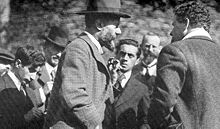Ernst Toller
| Ernst Toller | |
|---|---|

Ernst Toller (back) and Max Weber (front, bearded) in May 1917 at the Lauensteiner Tagung
|
|
| Born |
December 1, 1893 Samotschin, Posen, Germany |
| Died | May 22, 1939 (aged 45) New York City, United States |
| Nationality | Germany |
Ernst Toller (1 December 1893 – 22 May 1939) was a German left-wing playwright, best known for his Expressionist plays. He served in 1919 for six days as President of the short-lived Bavarian Soviet Republic, and was imprisoned for five years for his actions. He wrote several plays and poetry during that period, which gained him international renown. They were performed in London and New York as well as Berlin. In 2000, several of his plays were published in an English translation.
In 1933 Toller was exiled from Germany after the Nazis came to power. He did a lecture tour in 1936-1937 in the United States and Canada, settling in California for a while before going to New York. He joined other exiles there. Struggling financially and depressed at learning his brother and sister had been sent to a concentration camp in Germany, he committed suicide in May 1939.
Toller was born in 1893 into a Jewish family in Samotschin (Szamocin), Province of Posen, Prussia (Posen is now part of Poland). He had a sister and brother. They grew up speaking Yiddish and German, and he later became fluent in English.
At the outbreak of World War I, he volunteered for military duty. After serving for thirteen months on the Western Front, he suffered a complete physical and psychological collapse. His first drama, Transformation (Die Wandlung, 1919), was wrought from his wartime experiences.
Together with leading anarchists, such as B. Traven and Gustav Landauer, and communists, Toller was involved in the short-lived 1919 Bavarian Soviet Republic. He served as President from April 6 to April 12. His government did little to restore order in Munich. His government members were not always well-chosen. For instance, the Foreign Affairs Deputy Dr. Franz Lipp[] (who had been admitted several times to psychiatric hospitals) informed Vladimir Lenin via cable that the ousted former Minister President, Johannes Hoffmann, had fled to Bamberg and taken the key to the ministry toilet with him. On Palm Sunday, April 1919, the Communist Party seized power, with Eugen Leviné as their leader. Shortly after that, the republic was defeated by right-wing forces.
...
Wikipedia
